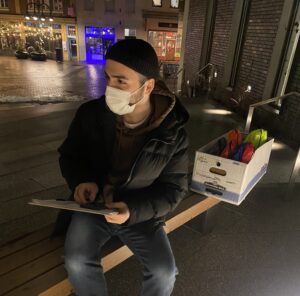By: Becca Ford, Researcher II, and William Bradford, Business Development
This winter, ORB staff volunteered to provide data collection expertise to Charlottesville, Virginia’s local homelessness coalition for the annual Point-in-Time (PIT) homelessness count. The Point-in-Time (PIT) Count is a nationwide survey conducted annually by the United States Department of Housing and Urban Development (HUD) to give insight into the scale of homelessness, estimate social subcategories (veterans, youth, etc.), and identify local needs1. ORB helped Charlottesville’s Blue Ridge Area Coalition for the Homeless (BRACH) by digitizing their survey for the first time, conducting volunteer survey trainings, administering surveys, and cleaning and analyzing data.

Photo 1: ORB Researcher conducting a survey
ORB’s first responsibility was to convert the decade-old paper survey into a digital survey. We used SurveyToGo, ORB’s preferred interview platform, to script an easy-to-follow survey that volunteers could use on personal smartphones or tablets. SurveyToGo offers a user-friendly interface, an intuitive one-question-at-a-time display with on-screen interviewer prompts and instructions. These advantages make the process as simple as possible for BRACH volunteers, which improves volunteer experience and decreases survey error. Further, using software eliminates the need for manual data entry, which decreases the potential for data entry mistakes and provides near-immediate analysis and data visualizations. After a short tutorial by ORB staff, the volunteers picked up on SurveyToGo’s process and were ready for fieldwork.
The night of the count, ORB staff provided tablets to those without personal devices, served as volunteers, and remained on-call to resolve any issues. We set out with the other volunteers to listen to Charlottesville’s unsheltered homeless population. We walked the survey areas for several hours, stopping to speak with anyone experiencing homelessness we encountered.
Each survey gave space for conversations about past living experiences, mental health concerns, and the realities of shelter availability in Charlottesville. One ORB researcher reflected, “Hearing the stories and unique perspectives of those we interviewed was an impactful experience, and it is so important in gaining an understanding of this underserved population.” After each interaction, we distributed BRACH-provided bags with warm clothes, snacks and water, regardless of whether a formalized survey was completed.

Photo 2: Downtown Charlottesville at sunset
Following the PIT count, ORB reviewed and cleaned data for quality and provided a comprehensive dataset with key data visualizations to BRACH. ORB researchers continue to remain on-call for BRACH to offer any additional data resources necessary to advocate for the Charlottesville area homeless.
ORB is thankful for the opportunity to use our research expertise for our Charlottesville community. The data we collected alongside other volunteers allows BRACH to tell a more accurate story regarding the realities of homelessness in Charlottesville and the surrounding areas. BRACH can use this data as it seeks to open new shelters, petition for more resources, and apply for additional funding. ORB looks forward to using our experience working with BRACH in future PIT Counts to optimize data collection and dissemination to best serve our city.
______________________________________
